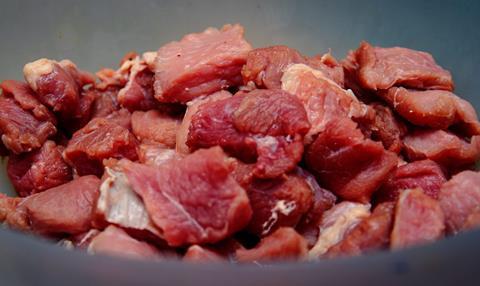UK trade bodies have responded to Switzerland's new climate strategy for agriculture, in which Switzerland's Federal Office for Food Safety and Veterinary Affairs (FOSV) discourages the Swiss public from consuming more than three portions of meat a week.

The 2050 Climate Strategy for Agriculture and Food aims to make the Swiss food system "more sustainable by reducing greenhouse gas emissions from agriculture while helping agriculture adapt to climate change."
According to SwissInfo.ch, Michael Beer of the Federal Office for Food Safety and Veterinary Affairs (FOSV) said to the media: "Two to three portions of meat a week is a maximum from a health point of view. We are eating three times too much."
The Swiss Farmers' Union has taken the stance that a focus on adapting agriculture to global warming is a positive change, but that limiting the consumption of meat and livestock production is not the correct way to do this. This comes alongside their aims to maintain the "typical family-run farm" and ensure an income for farmers "comparable with that of other sectors of the economy."
UK response to Swiss advice
Tony Goodger, a representative of the Association of Independent Meat Suppliers (AIMS), said: “Many of the measures that have been proposed such as reducing waste through the supply chain, greater use of renewable energy and managing water sparingly will undoubtedly help the Swiss Government’s ambitions to reduce GHG emissions by at least 40% compared to 1990 levels.
"As we are unsure what the level was in 1990, I suggest that many production initiatives from Swiss livestock farmers and processors are likely to have already made a significant difference when coupled with ‘new knowledge’ such as methane reduction via feed additives and better breeding.
"I note that their principal objective is to achieve 50% food self sufficiency by 2050 as a means to achieve better food security, and I suggest that this could be done through more livestock production using regenerative processes to deliver high quality meat along with organic fertiliser to enrich both pasture and soil for horticultures.
"It is my view that some within the annals of the Swiss civil service are maybe peddling their own agendas, rather than what is best for the country’s residents and tourism sectors.”
Lucas Daglish, sustainability manager at the British Meat Processors Association (BMPA) said: "It's important to take account of the origin and method of production of food when changing our diet for environmental rather than nutritional reasons.
"Countries that benefit from ideal conditions to rear livestock (like the UK and New Zealand’s grass-fed systems, amongst others) need to be cautious of the unintended consequences of well-intentioned policies that ‘backfire'. Policy decisions should be made using scientifically robust metrics that accurately distinguish between different farming systems.
"We agree with the ‘less but better’ axiom and would apply it to both animal and plant-based foods. First and foremost, any policy decisions should result in equitable access to foods that provide quality nutrition, particularly to those on lower incomes and in vulnerable situations.
"However, if political or social engineering drives people to make what they think are more environmentally friendly choices by steering them away from natural, nutritious whole foods towards unhealthy, highly processed substitutes, then a decline in public health will be one of the unintended consequences."
This story was originally published on a previous version of the Meat Management website and so there may be some missing images and formatting issues.















